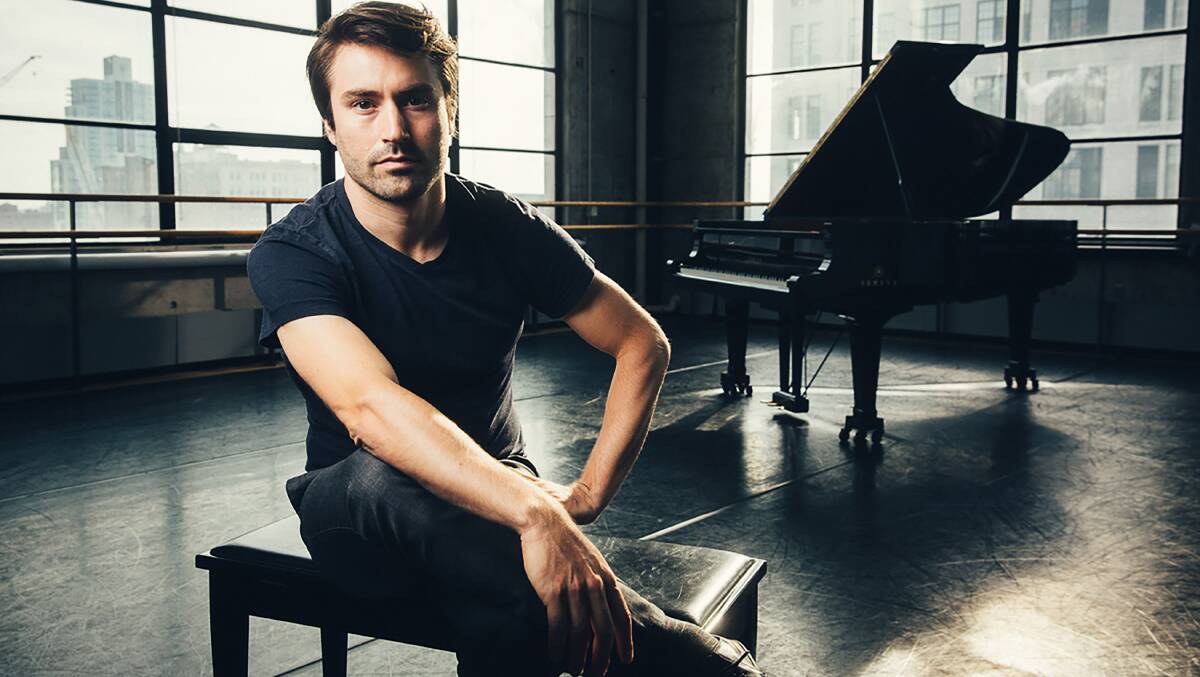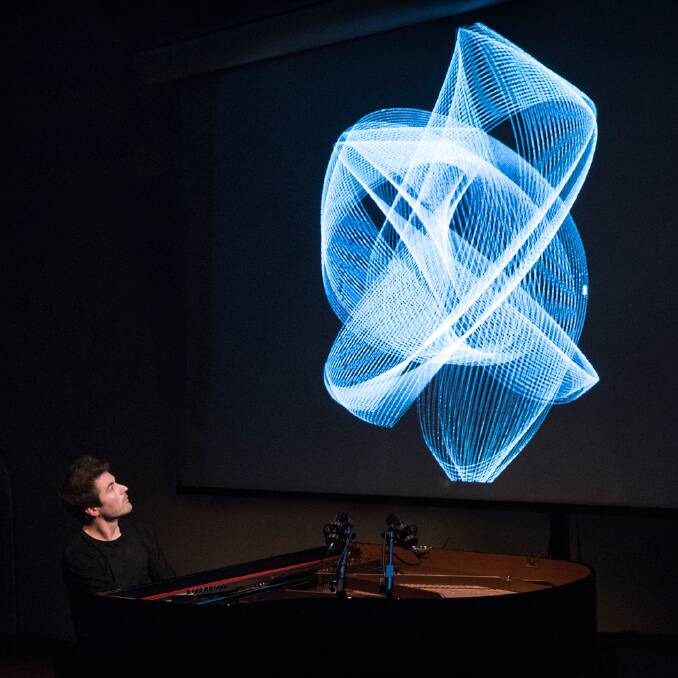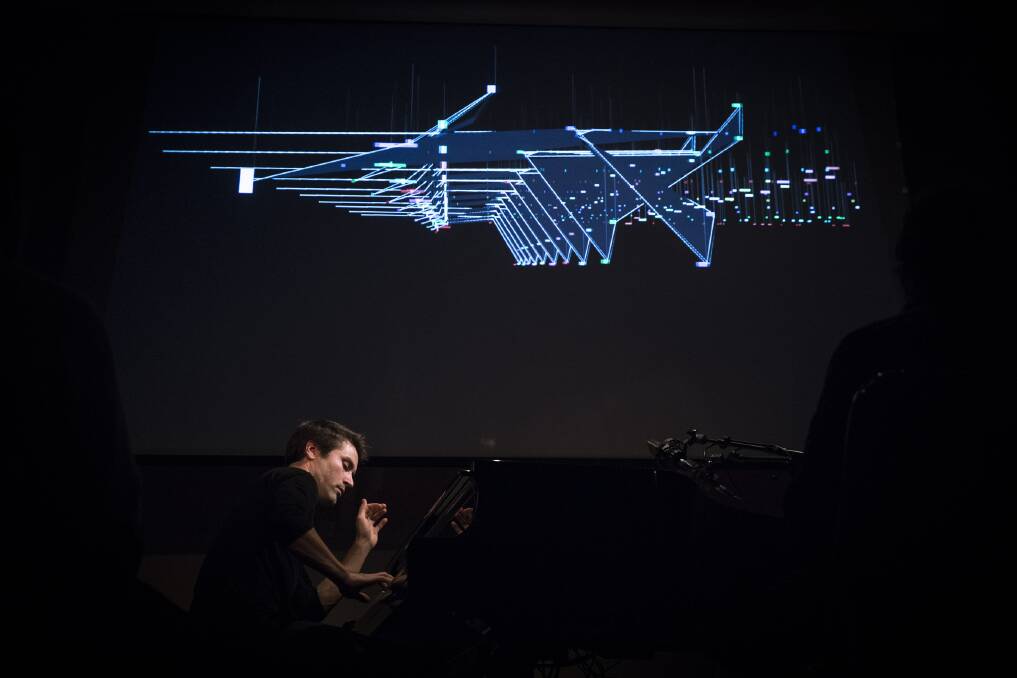
Man or machine? It's the question surrounding Dan Tepfer's music.
Subscribe now for unlimited access.
$0/
(min cost $0)
or signup to continue reading
The pianist - who performs at The Street this month - is challenging the definition of music. Or more to the point, expanding the rules around what can make it.
At first glance, it looks like Tepfer is playing the piano. But look and listen carefully - more notes are being played, more keys being pressed, than what the pianist himself is playing.
That's because Tepfer has written algorithms that see his Yamaha Disklavier - the self-playing piano you may see in hotel lobbies - improvise along with him in real-time.
To the average listener, it seems as if this type of performance is one where science and music intersect. One where the computer is as much in control of the outcome as the musician. Or at least, one where the musician is not completely in control over the outcome.
And while this may cause debates amongst his audience, to Tepfer the answer is clear. There would be no music without him. And the computer is just another instrument.
"My algorithms don't do anything unless I'm playing," Tepfer says.
"It's all a reaction to what I'm doing so 100 per cent of the material of what's happening musically, is coming from me improvising.
"My favourite music lives at the intersection of the algorithmic and the spiritual.
"That's because a lot of great music and great art in general, on the one hand, uses systems of rules to structure the information. And on the other hand, these logical systems, if they're well designed, leave sufficient degrees of freedom for the artist to express themselves emotionally and intuitively."

It's within these rules that Tepfer finds freedom to be creative and in the moment - after all, he is an improvisational musician, the very definition of which is linked with freedom.
And, as he points out, this relationship between rules and creativity appears in other forms of art. Take architecture - you need to deal with the laws of physics at some point as well as create something beautiful to live in. One can't happen without the other.
And even music (sans computer coding) still has its own set of rules - albeit maybe not as strict as the songs played using an algorithm.
So that does pose the question - are computer algorithms the future of music?
MUST READS:
"I don't think of it as the future, I think of it just as for me, something that I feel the need to explore," Tepfer says.
"I think it's important to note that music has always historically had a very close relationship with technology. Over the centuries, often music immediately jumped on new developments in technology.
"Just as an example, the pipe organ in Bach's time was literally the most sophisticated piece of technology on Earth, and Bach himself was an expert in organ repair. As soon as a new instrument came out - for example, towards the end of Bach's life, the piano was invented - Bach would rush to check it out, and often would write new pieces for it.
"So I see computers as just another step on that journey of music always integrating the newest developments in technology."

If anything, this entire project - which included the release of the video album Natural Machines in 2018 - has only reaffirmed to Tepfer the value of bringing his whole musical self to a piece.
"If it weren't for that, then it would just be some technological gimmick."
It was Tepfer's musical side that birthed the desire to create music with algorithms.
While the musician has been coding since his dad first brought home a computer in the late 1980s, it was only when he started ear training, where he needed a second person to help out, he decided writing a code could help the process.
That opened the door to then creating code to make music. And then writing code to create visualisations to represent that music, which will also be on show during his performance at The Street.
"I've worked really hard to do in each one of the visualisations that I've written, is to show the underlying structure of the music," Tepfer says.
"So for example, if you know in my algorithm that's written in an inverted canon ... I've made it really obvious that what the piano is playing in response to what I'm playing is an exact mirror image of what I'm playing. That kind of symmetry is really attractive visually, and just illuminates what's happening in music and allows people to understand it better.

"I think there are a lot of people to whom just straight acoustic music is maybe not stimulating enough at this point. And what I found is that these visuals ... it allows some people to get into the music, who might have had trouble getting into it, otherwise, especially, for example, kids love it."
Dan Tepfer will bring Natural Machines to The Street on October 23. As well as his performance at The Street, Tepfer will be hosting a masterclass on the world of the Yamaha Disklavier and reproducing piano for composers, pianists, and musicians on October 24. For tickets to either event go to thestreet.org.au.
We've made it a whole lot easier for you to have your say. Our new comment platform requires only one log-in to access articles and to join the discussion on The Canberra Times website. Find out how to register so you can enjoy civil, friendly and engaging discussions. See our moderation policy here.
Our journalists work hard to provide local, up-to-date news to the community. This is how you can continue to access our trusted content:
- Bookmark canberratimes.com.au
- Download our app
- Make sure you are signed up for our breaking and regular headlines newsletters
- Follow us on Twitter
- Follow us on Instagram


